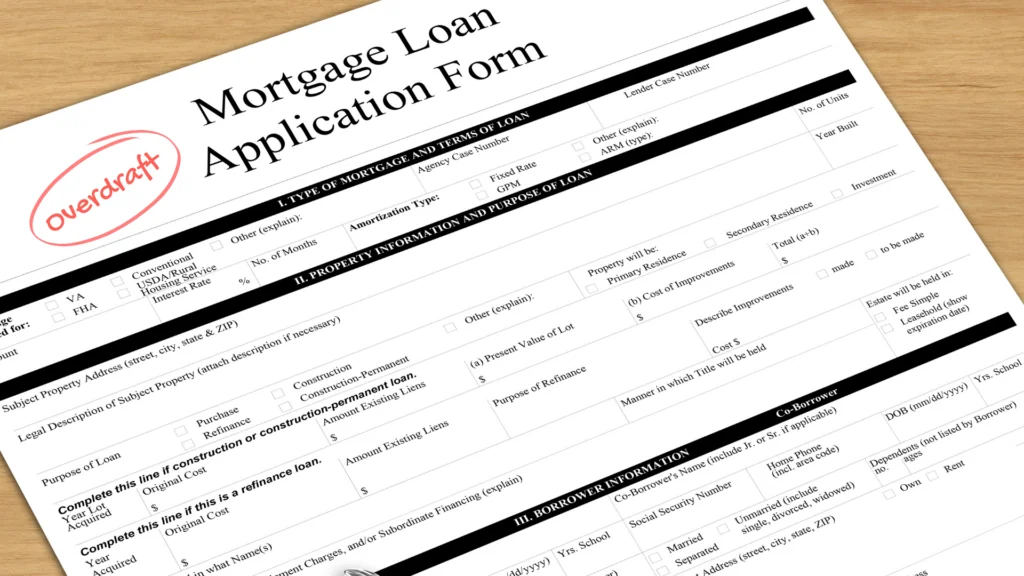- What Does a 4.5 Times Salary Mortgage Mean?
- Is a Mortgage Always Based on 4.5 Times Your Salary?
- How Does a 4.5 Times Salary Mortgage Work?
- How Much Can You Borrow With a 4.5 Times Salary Mortgage?
- Can You Get a 4.5 Times Salary Mortgage as a Single Applicant?
- How Does a Joint Mortgage Work With 4.5 Times Salary?
- How Much Deposit Do You Need for a 4.5 Times Salary Mortgage?
- Can You Get a 4.5 Times Salary Mortgage With Bad Credit?
- Can I Get a 4.5 Times Salary Mortgage if I’m Self-Employed?
- Want to Borrow More? Try These Tips
- Is a 4.5 Times Salary Mortgage Right for You?
- Key Takeaways
- The Bottom Line
Mortgages 4.5 Times Salary: Everything You Need To Know

When you’re buying a home, knowing how much you can borrow is essential.
In the UK, lenders often base mortgages on a multiple of your salary, with 4.5 times your annual income being a common figure.
But what does this really mean, and how can you ensure you get the best deal?
This guide will explain how 4.5 times salary mortgages work and offer tips to help you maximise your borrowing power.
What Does a 4.5 Times Salary Mortgage Mean?
A 4.5 times salary mortgage is a way to calculate how much you can borrow based on your income.
If a lender offers this, they’ll multiply your annual salary by 4.5 to find the maximum they might lend you.
For example, if you earn £40,000 a year, you could borrow up to £180,000.
This is just a starting point, though.
Lenders will also look at your credit score, deposit, and monthly expenses before deciding how much to lend.
Is a Mortgage Always Based on 4.5 Times Your Salary?
No, a mortgage isn’t always based on 4.5 times your salary.
While it’s a common figure, lenders may offer more or less depending on your financial situation.
Factors like your credit score, job stability, and any existing debts will influence how much they’re willing to lend.
If you have a high credit score, a stable job, and a large deposit, you might be able to borrow up to 5 or even 6 times your salary.
But if your credit score is low or you have other financial commitments, the amount you can borrow might be lower.
How Does a 4.5 Times Salary Mortgage Work?
To get a 4.5 times salary mortgage, you’ll need to provide proof of your income, such as payslips, P60s, or tax returns if you’re self-employed.
The lender will then review your income and outgoings, including any existing debts, to work out how much you can afford to borrow.
Lenders also run a stress test to see if you could still afford the mortgage if interest rates go up.
This helps make sure you don’t borrow more than you can manage.
Here’s a simple example:
If you earn £40,000 a year and a lender offers you a mortgage at 4.5 times your salary, you could potentially borrow up to £180,000 (£40,000 x 4.5).
However, the lender will also look at your outgoings to get a clearer picture.
Let’s say you spend:
- £300 on a car loan
- £200 on credit card payments
- £1,200 on living costs (like bills and groceries)
- £400 on childcare
That’s £2,100 a month.
If your take-home pay is £2,500 a month, you’re left with £400 after covering your expenses. This amount would need to cover your mortgage payments.
If the mortgage payments are around £800 a month, the lender might offer you less than £180,000 because your budget wouldn’t stretch far enough. They might suggest a smaller loan or a longer term to lower the payments.
This check helps make sure you can afford the mortgage now and in the future.
How Much Can You Borrow With a 4.5 Times Salary Mortgage?
The amount you can borrow with a 4.5 times salary mortgage will depend on your income and other financial factors.
Here’s a quick reference guide:
| Annual Salary | 4.5 Times Salary Mortgage |
|---|---|
| £20,000 | £90,000 |
| £30,000 | £180,000 |
| £60,000 | £270,000 |
| £80,000 | £360,000 |
| £100,000 | £450,000 |
This table gives you a rough idea, but it’s important to remember that lenders will also factor in your monthly outgoings, credit score, and deposit when deciding how much to lend.
Try the affordability calculator to see how much you can borrow based on your income.
Can You Get a 4.5 Times Salary Mortgage as a Single Applicant?
Yes, you can get a 4.5 times salary mortgage as a single applicant.
However, you’ll need to meet the lender’s affordability checks, which means proving you can afford the monthly repayments on your own.
Having a good credit score and a solid deposit can really help.
As a single applicant, you might find that your choice of lenders is a bit more limited compared to joint applicants, as some lenders prefer the added security of two incomes.
How Does a Joint Mortgage Work With 4.5 Times Salary?
With a joint mortgage, you combine your incomes to borrow more. For example, if you and your partner both earn £30,000 a year, you could borrow up to £270,000 (£60,000 combined income x 4.5).
Lenders will look at your combined income, credit scores, and outgoings, including any existing debts and living expenses, to make sure you can afford the repayments.
Joint mortgages are popular with couples, friends, or family members who want to buy a property together.
But remember, you’re both equally responsible for the repayments, even if one person’s situation changes.
How Much Deposit Do You Need for a 4.5 Times Salary Mortgage?
In the UK, the minimum deposit for a mortgage is usually 5%, but having a larger deposit can help you get better terms.
For a 4.5 times salary mortgage, lenders often prefer a deposit of at least 10%, though this can depend on your financial situation and the property you’re buying.
A larger deposit lowers the loan-to-value (LTV) ratio, which can help you get a lower interest rate and reduce your monthly payments. It also gives you more equity in your property, which can be useful if house prices drop.
Can You Get a 4.5 Times Salary Mortgage With Bad Credit?
Yes, you can get a 4.5 times salary mortgage with bad credit, but it might be more challenging.
Lenders will likely check your credit history more closely and might offer you a lower income multiple or higher interest rates.
Bad credit can also limit your choice of lenders, as some may see you as a higher risk. You could also face higher fees or need a larger deposit to offset the risk.
To improve your chances, it’s a good idea to work on your credit score before applying.
This could mean paying off debts, making sure all your bills are paid on time, and fixing any errors on your credit report.
Doing this can help you get a better deal and lower the long-term costs of your mortgage.
Can I Get a 4.5 Times Salary Mortgage if I’m Self-Employed?
Yes, you can get a 4.5 times salary mortgage if you’re self-employed, but it might be a bit more complicated.
Lenders often see self-employment as less predictable, so they usually ask for more proof of your income and financial stability.
To qualify, you’ll likely need to provide:
- Two or More Years of Accounts prepared by an accountant, showing steady or growing profits.
- SA302 Forms and Tax Year Overviews from HMRC to show your income and tax paid over the past few years
- Recent Bank Statements (usually three to six months) to show your income and that you manage your money well.
- Deposit of at least 10% or 20% of your home’s value.
- Good Credit History
- Extra Documents such as client contracts, or proof of future income to show your business is stable.
Lenders can be picky about self-employed applicants, so it might help to use a qualified mortgage broker.
They know which lenders are good for self-employed people and can help you get the best deal.
Want to Borrow More? Try These Tips
If you need to borrow more than 4.5 times your salary for a mortgage, here are some things you can do:
- Fix your credit score. Pay off debts, make sure you’re on the electoral list, and always pay bills on time. Check your credit report for mistakes too.
- Save more. A bigger deposit helps. Try to save more or look at government schemes to boost your savings.
- Spend less. Lenders like to see you have money left after bills. Cut back on spending and pay off debts if you can.
- Get a partner. Applying with someone else can mean you can borrow more as you’ll both count.
- Use a broker. A mortgage broker can find lenders who might lend you more.
Is a 4.5 Times Salary Mortgage Right for You?
Borrowing 4.5 times your salary is a big deal. It means taking on a lot of debt.
If things change – like losing your job or higher interest rates – it could be tough to keep up with the mortgage payments.
Falling behind can be a real problem, and in the worst case, you could lose your home.
Lenders check how risky a mortgage is for you, but it’s smart to think about your own plan too. Having some savings to cover unexpected costs is a good idea.
Bottom line: Borrowing a lot against your salary is risky. Think carefully before you take the plunge.
Key Takeaways
- A 4.5 times salary mortgage lets you borrow more, but the amount depends on your income, credit score, deposit, and expenses.
- Lenders may offer more or less than 4.5 times your salary based on your job stability, debts, and financial situation.
- A joint mortgage can increase your borrowing power by combining incomes, but both of you are responsible for repayments.
- A larger deposit (10% or more) can help you get better terms and lower monthly payments.
- Bad credit can make it harder to get a 4.5 times salary mortgage, often leading to higher rates or fewer options.
- If you’re self-employed, you’ll need detailed financial records and may need a larger deposit.
- Borrowing 4.5 times your salary is a big commitment, so have a financial safety net for changes in income or interest rates.
The Bottom Line
There you have it: Smart borrowing means knowing your limits.
A 4.5 times salary mortgage gives you more borrowing power, but it’s important to be cautious. Make sure you can comfortably manage the repayments to keep your finances stable.
A good mortgage advisor can offer valuable guidance, helping you find the best deal for your situation. Their expertise can save you time and help you avoid costly mistakes.
If you want to make the right choice and avoid unnecessary stress, get in touch with us.
We’ll connect you with a trusted broker who can guide you through your mortgage options with confidence.
Get Matched With Your Dream Mortgage Advisor...

Frequently asked questions
What happens if I can't keep up with repayments on a 4.5 times salary mortgage?
If you struggle to make repayments, it’s crucial to contact your lender as soon as possible. They may be able to offer temporary relief or restructure your mortgage. Failing to make payments could lead to repossession, so it’s important to address any issues early.
Are there any government schemes that can help with a 4.5 times salary mortgage?
Yes, schemes like Help to Buy and Shared Ownership can assist in securing a mortgage with a lower deposit, but they come with specific eligibility criteria and conditions, so it’s essential to understand these fully before applying.
Can I get a 4.5 times salary mortgage for a non-standard property?
It’s possible, but you may need to work with a specialist lender. Non-standard properties, such as those with unusual construction materials, can be harder to mortgage, so seeking expert advice is recommended.




